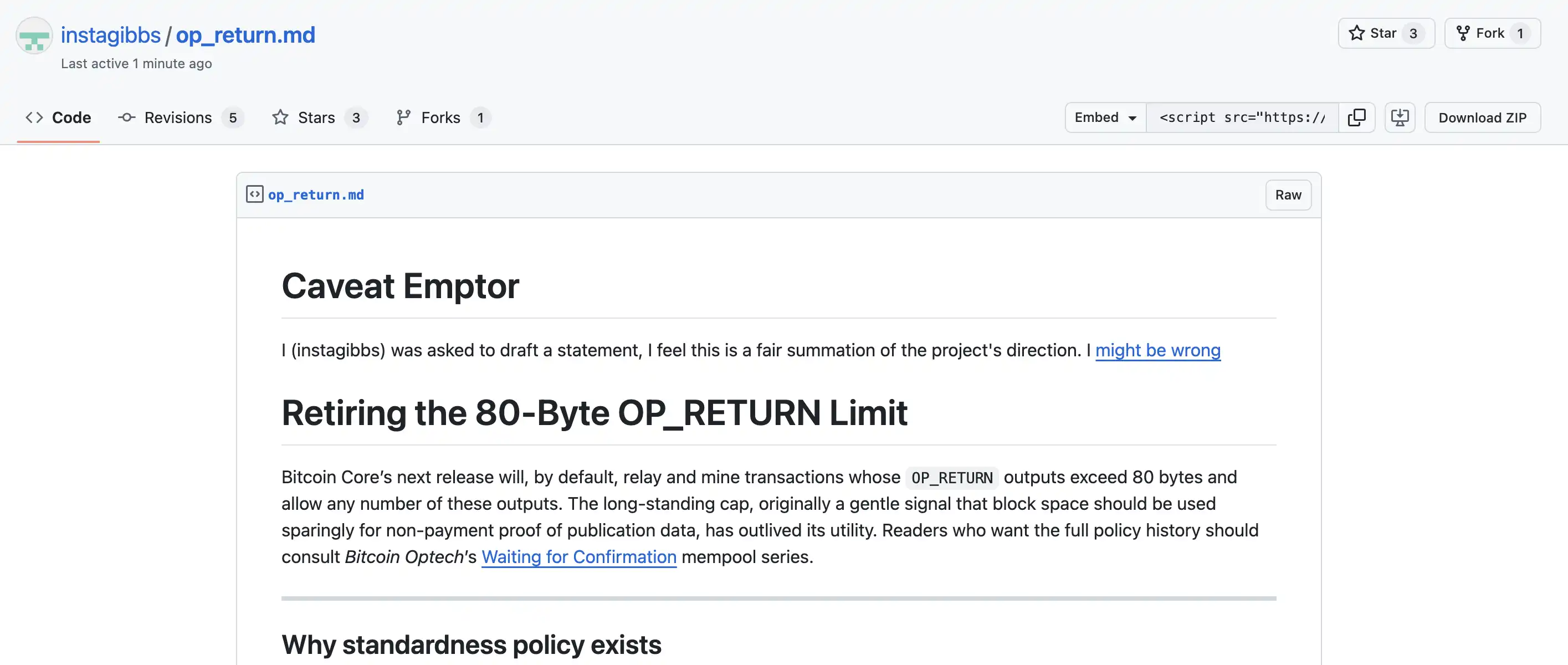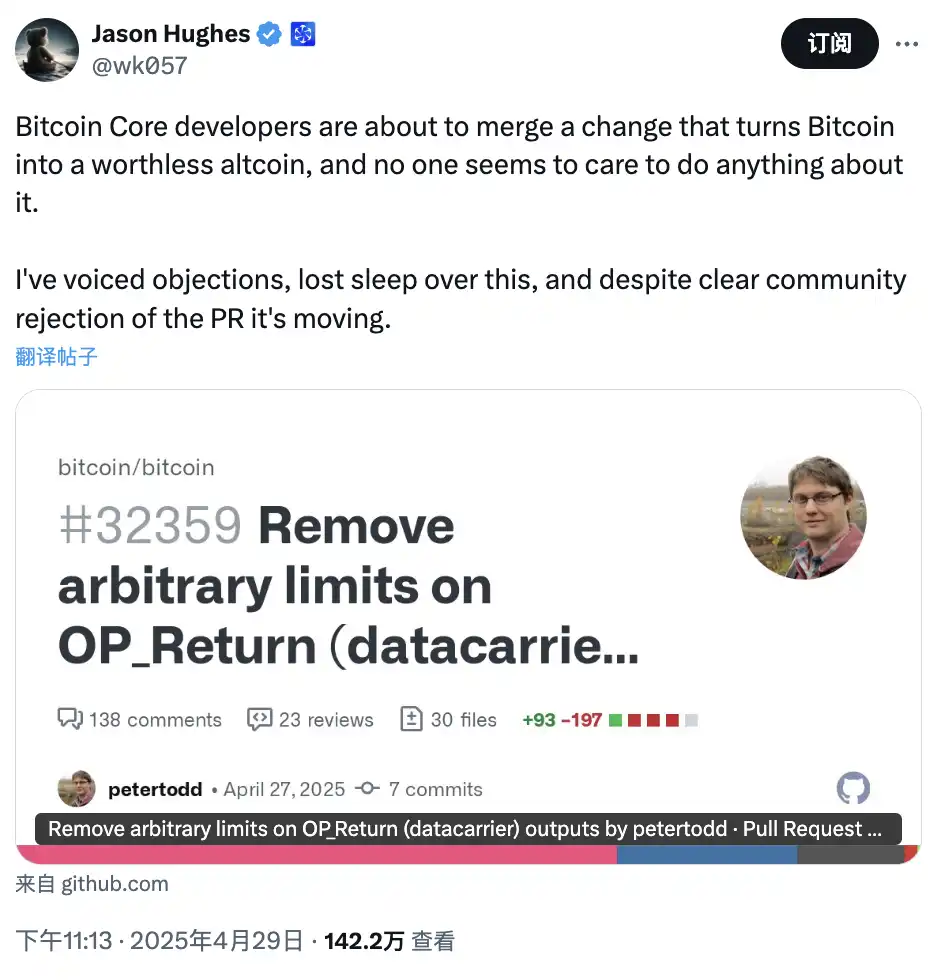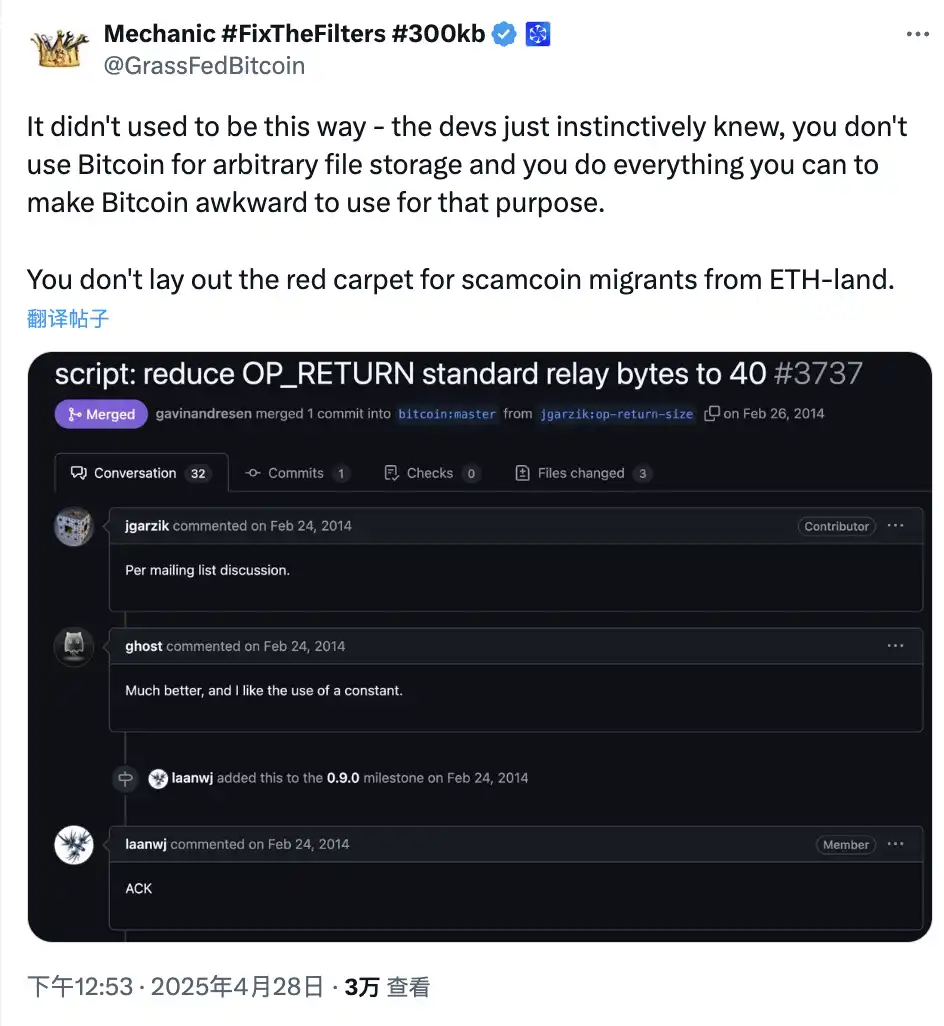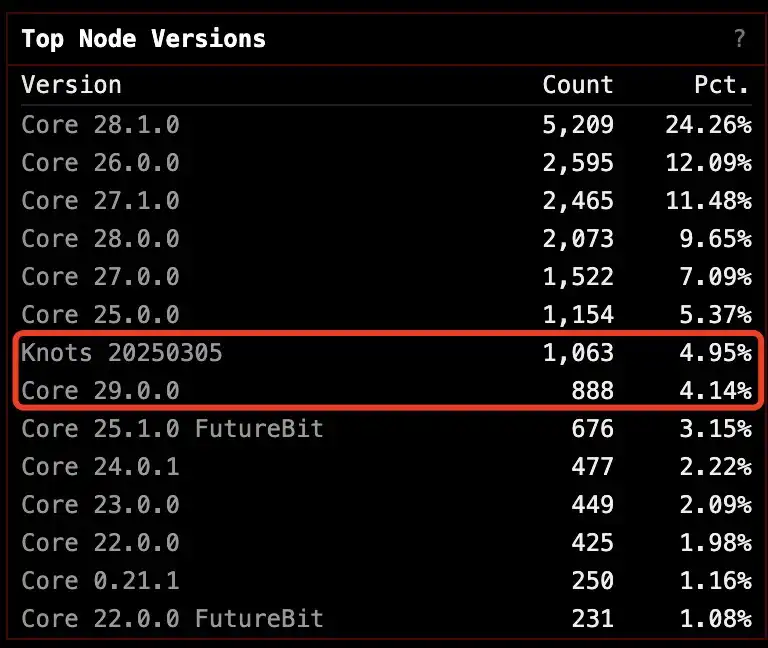这几天,外网针对取消 OP_RETURN 限制的提案沸沸扬扬——这是比特币 Bitcoin Core OG 开发者 Peter Todd 发出的提案。
(值得一提的是,HBO 曾大肆宣传的纪录片《货币电气:比特币之谜》中指认 Peter Todd 就是中本聪,这导致他收到大量拨款请求和威胁,目前已躲藏起来生活。)
虽然社区里对这 OP_RETURN 改动的质疑声不少,但根据比特币开发者、Blockstream 核心贡献者 Greg Sanders(昵称「instagibbs」)于 5 月 5 日在 GitHub 上 发布的公告:在下一次网络升级中,Bitcoin Core 将不再对 OP_RETURN 做任何字节或数量的限制。

OP_RETURN 究竟是什么?
我们都知道,比特币是一部永远无法篡改的账本,每笔交易都像往上面写下一行记录。
而 OP_RETURN,就好像在书页边缘贴上一张「便条」——你可以写几十个字的文字或小段数据进去,这条便条被系统标记为「只读」,别人既拿它当不了钱,也不会对账本其它「钱」的记录产生任何影响。
之所以要有这样一个「便条」功能,是因为有时候人们希望把一些额外信息(比如法律证明、短消息、纪念日甚至表白)永久地钉在链上,但又不想占用 UTXO 那块用来存放「可交易」比特币的空间。借助 OP_RETURN,这些信息就像废纸一样被丢进一只抽屉——节点只留痕迹、不占存量,链上的「可用钱」依旧干净利落。
过去,为了防止有人写长篇「便条」把网络塞爆,Bitcoin Core 默认只允许每笔交易里出现一个 OP_RETURN,且最多存 80 字节的内容,超过时节点会直接拒绝中继,也不会帮忙打包。
现在,80 字节、单条数的限制全没了——想写多长写多长,几个便条都行,节点都自动中继、矿工都乐意打包。
但事实上,一直以来就有人正在绕过 80 字节。
之前有 OP_RETURN 限制的时候,也有方法可以绕过去 80 字节的限制,再严的过滤和中继策略都挡不住真正想在比特币上写数据的人。因为只有矿工和手续费才决定哪些交易上链,给矿工更高奖励,他们自然倾向于打包更多交易,玩法不会因节点策略而改变。
比如大家知道比较多的,Tapoort Wizz 大巫师 NFT 一张接近 4M 的图片塞满了一个区块,还有当年 Ordinals 铭文、符文这些都是用各种「绕路和变通」的方法,绕过了限制,有的甚至写进了可被花费的输出,反而更占资源。
这更符合比特币的精神?
根据比特币开发者 Greg Sanders 发布的公告和各种开发者的赞同意见,我们可以知道首先 Bitcoin Core 在交易传播(relay)阶段自有一套「标准策略」(standardness policy),用来在交易到达矿工前做三层把关:一是防范「拒绝服务」攻击,拒绝那些算力、内存或带宽消耗远超手续费的交易;二是通过策略引导钱包作者构造既省手续费又不制造冗余 UTXO 的交易;三是保留升级安全——把未知的操作码或版本位当成「非标准」,直到软分叉正式激活为止。
OP_RETURN 和它那 80 字节的上限,正是这套理念的产物:给用户一个可被证明「不可花费」的输出,既能存小段承诺或哈希,也能让节点不把它计入 UTXO,从而避免链上「血本无归」的垃圾输出。
可现在这个软性限额反倒成了鸡肋。一方面,私有矿池和一些中心化服务根本不执行这条规则,任何想写大量数据的人,都能通过绕过策略——要么直接付费给矿工,要么用 bare‑multisig、假公钥、甚至可花费脚本把信息藏进去——把要写的内容照样塞上链;另一方面,动不动就再加一堆黑名单过滤,只会演变成「猫捉老鼠」的博弈,既拦不住最基本的数据写入,又增加了误伤用户资金的风险。
赞同方的开发者认为,彻底移除 80 字节上限后,节点和钱包能享受到两大实际好处:一是 UTXO 集更干净,数据都装进一个明明白白的「不可花费」OP_RETURN 输出里,而非纠结在各种花哨的脚本或多个交易里;二是节点对传播哪些交易「说是」更统一,和矿工实际打包的内容保持一致,钱包的手续费估算和紧凑区块中继也更靠谱。
比特币开发者对比了三种方案,目前采用的「取消」方案在社区中声势最大。更重要的是,他们认为此次取消 OP_RETURN 限制,正是对比特币「透明简约」精神的最好诠释:当一个策略已经失去应有的作用,却依旧被保留,只会徒增复杂度和摩擦;将其剔除,则让节点软件更轻、更纯粹,也让每一笔交易的传播、打包都无须绕弯——矿工只需根据手续费高低来决定优先级,费率市场自然调节各种需求的竞争。
而一旦链上真的出现了过度写入、吞噬资源的威胁,比特币生态还有一整套经过考验的「靶向」防护:签名操作限制、前后代交易数上限、dust 规则……这些精准打击特定滥用场景的手段,比那一刀切的「80 字节」要灵活得多,也更能在不伤及正常使用的前提下,保护每一位节点与用户。
BTC 将变成山寨币?
其中最知名的反对者,应该属 Luke Dashjr 莫属。
作为比特币 OG,曾表示「Ordinals 协议是对比特币的攻击」、「铭文是垃圾,是 bug,可修复」的 Luke Dashjr,过去一直是 Ordinals 协议直言不讳的批评者。
这一次,他仍旧坚定了站在「保守」方,认为取消 OP_RETURN 限制是一个非常疯狂的事,是对比特币的攻击,他和其他人认为,取消限额将导致垃圾邮件和更高的交易费用。
能看出,目前争论和分歧的焦点在于,取消 80 字节 OP_RETURN 限制是否会提高透明度并简化比特币的数据使用,或者是否会为滥用、垃圾邮件和比特币偏离金融重点打开大门。
Ocean 矿池副总裁 Jason 是批评声音最强烈的人之一,他为此失眠,甚至直言:「这个变化将使比特币变成毫无价值的山寨币。」

Botanix Labs 创始人 Willem Schroe 表示,他认为开发者应该把比特币作为货币系统,而不是数据存储平台。而另一位比特币核心开发者 Mechanic 的观点也类似:比特币不应该被用于任意文件存储,应该采取一切可能的措施来确保这一点。

一些业内颇有影响力的 KOL,如 Samson Mow,正在鼓励节点运营商不要升级他们的 Bitcoin Core 版本,或者改用 Knots。
截至撰稿时,根据Clark Mood 的数据来看,Bitcoin Knots 节点的使用率超越了最新版本的 Bitcoin Core 节点。

这又是一次比特币共识的挑战,就像之前发生过的许多次那样。当然这也让我们意识到,虽然比特币相比大多数网络都更保守,但也并不是一成不变的,在下一次升级之后,我们也有可能会得到比 Ordinals 、Atomicals、Runes 更简洁和优雅的协议玩法。
免责声明:本文章仅代表作者个人观点,不代表本平台的立场和观点。本文章仅供信息分享,不构成对任何人的任何投资建议。用户与作者之间的任何争议,与本平台无关。如网页中刊载的文章或图片涉及侵权,请提供相关的权利证明和身份证明发送邮件到support@aicoin.com,本平台相关工作人员将会进行核查。




